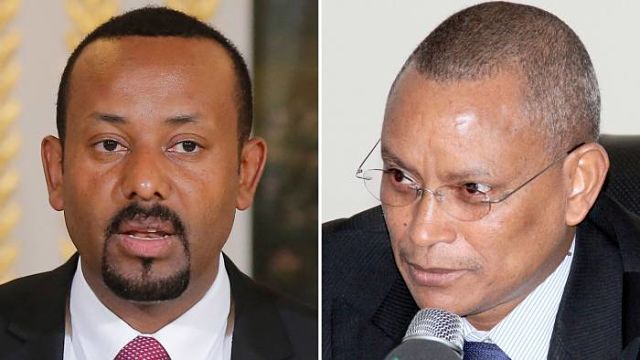 Abiy Ahmed and Debretsion Gebremichael, chairman of the Tigray People's Liberation Front. Premier’s stellar reputation gets frosty reception among formerly dominant Tigrayans. For many of the 5m-plus residents of Tigray, Mr Abiy is not so much saviour as threat. If the gloss eventually comes off the prime minister’s story, that process will have begun in Tigray. (© Getty)
Abiy Ahmed and Debretsion Gebremichael, chairman of the Tigray People's Liberation Front. Premier’s stellar reputation gets frosty reception among formerly dominant Tigrayans. For many of the 5m-plus residents of Tigray, Mr Abiy is not so much saviour as threat. If the gloss eventually comes off the prime minister’s story, that process will have begun in Tigray. (© Getty)
THE FINANCIAL TIMES
Mekelle — Ever since Abiy Ahmed became prime minister of Ethiopia last April, Africa’s youngest leader has been hailed as one of the most progressive figures on the continent. A former army intelligence officer who has forged peace with Eritrea, packed his cabinet with women and overseen the mass release of political prisoners, he has been greeted as a national saviour by many of Ethiopia’s 105m people.
But enthusiasm for Mr Abiy, 42, stops in Tigray, Ethiopia’s northernmost state and a dominant force in national politics since a Tigrayan rebel army overthrew the hated Marxist Derg regime in 1991.
For many of the 5m-plus residents of Tigray, Mr Abiy is not so much saviour as threat. If the gloss eventually comes off the prime minister’s story, that process will have begun in Tigray.
To the region’s people, Mr Abiy’s shake-up of the Ethiopian state, which has targeted Tigrayans in top positions, is widely seen as biased and vindictive. Even his rousing talk of national unity is viewed as an attack on the federal constitution, which devolves significant powers to nine ethnically defined territories, including Tigray.
“Concentrating on one ethnic group is dangerous,” said Debretsion Gebremichael, acting president of the Tigray region, who added that Mr Abiy’s crackdown on corruption had an anti-Tigrayan bias. Adding that he initially opposed Mr Abiy’s selection as chairman of the ruling coalition and hence prime minister last year, he said: “I told him: ‘You are immature. You are not the right candidate’.”…
To Mr Abiy’s supporters, the prime minister is merely cleaning house and correcting the over-representation in Ethiopia’s state apparatus of Tigrayans, who comprise only 6 per cent of the population.
Mr Abiy categorically denies any ethnic bias, saying he is governing for all Ethiopians. In a recent interview with the Financial Times, he emphasised the concept of medemer, which roughly translates as strength in diversity. To achieve that, he said, he must resist any tendency towards ethnic ultranationalism and instead promote national unity and national pride.
Mohammed Ademo, founder and editor of OPride, a news website focused on Oromo issues, said the complexity of Ethiopia’s political jigsaw would be Mr Abiy’s greatest challenge. “We need to dial down ethnic tensions,” he added. “I wish Abiy were superhuman and could make that disappear.”
Read the full article at FT.com »
—
Join the conversation on Twitter and Facebook.

























